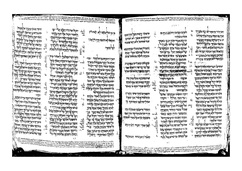|
Jeremiah 16
Jeremiah 16 is the sixteenth chapter of the Book of Jeremiah in the Hebrew Bible or the Old Testament of the Christian Bible. This book contains prophecies attributed to the prophet Jeremiah, and is one of the Books of the Prophets. In the first part of this chapter (verses 1 to 9), Jeremiah is instructed to adopt a lifestyle which will serve as a "symbolic enactment of God's word",[1] comparable to the instructions given to other prophets: see Hosea 1:2–9, Isaiah 8:3–4 and Ezekiel 24:15–24. TextThe original text of this chapter is written in the Hebrew language. This chapter is divided into 21 verses. Textual witnessesSome early manuscripts containing the text of this chapter in Hebrew are of the Masoretic Text tradition, which includes the Codex Cairensis (895), the Petersburg Codex of the Prophets (916), Aleppo Codex (10th century), Codex Leningradensis (1008).[2] There is also a translation into Koine Greek known as the Septuagint, made in the last few centuries BCE. Extant ancient manuscripts of the Septuagint version include Codex Vaticanus (B; B; 4th century), Codex Sinaiticus (S; BHK: S; 4th century), Codex Alexandrinus (A; A; 5th century) and Codex Marchalianus (Q; Q; 6th century).[3] ParashotThe parashah sections listed here are based on the Aleppo Codex.[4] Jeremiah 16 is a part of the Sixth prophecy (Jeremiah 14-17) in the section of Prophecies of Destruction (Jeremiah 1-25). {P}: open parashah; {S}: closed parashah.
Verse 2
According to Reformation theologian John Calvin, "the prohibition to marry was full of meaning; it was to show that the people were wholly given up to destruction".[6] Verse 3
Verse 4
Repeated in verse 6:
Verse 5
Similarly, the prophet Ezekiel is instructed not to mourn when his own wife dies.[11] See also
References
Bibliography
External linksJewishChristianInformation related to Jeremiah 16 |
||||||||||||||||||

